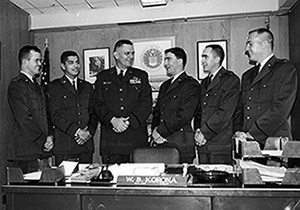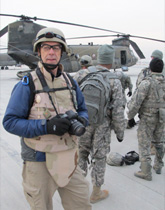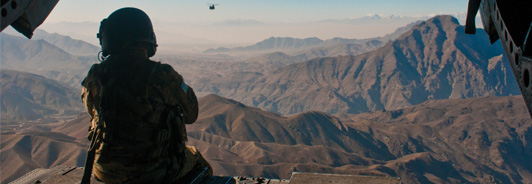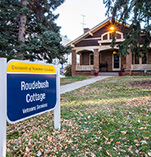"I was remiss in not praising the great cover of Northern Vision Magazine. Not only is it beautiful but as a Veteran of the U.S. Army it made me feel proud that I served, thank you, thank you!"
Dan Benavidez
Ken Scar
I am a 1992 graduate of UNC, with BA degrees in Theater and Journalism. I joined the Army in 2009 and am currently a photojournalist stationed at Fort Hood, Texas. I deployed to Afghanistan from April 2011 to April 2012. In 2011 I received the Thomas Jefferson award for outstanding new writer in the U.S. military, and this year I received the Paul D. Savanuck Military Journalist of the Year award. To read more about my career as an Army journalist, please check out my LinkedIn page.
Sgt. Ken Scar, U.S. Army photojournalist, 7th Mobile Public Affairs Detachment, FORSCOM PAO, Fort Hood, Texas
Photo above: Among Scar’s award-winning work is his photo of a soldier peering out from an open hatch of a Chinook helicopter over the mountains of Afghanistan.
Ronald L. Ramey
 I am a graduate of Colorado State College (before it was called UNC) and was commissioned as a 2LT through the AFROTC program, Det. 100, on Dec. 7, 1960. I completed 23+ years on active duty and retired on July 1, 1984 in the grade of Lt. Col.
I am a graduate of Colorado State College (before it was called UNC) and was commissioned as a 2LT through the AFROTC program, Det. 100, on Dec. 7, 1960. I completed 23+ years on active duty and retired on July 1, 1984 in the grade of Lt. Col.
I am attaching a picture of the day 6 of us were commissioned, Dec. 7, 1960. There were about 25 cadets in the 1960 class. Most of them graduated in May and August. We were the last 6 of the 1960 class. The Professor of Aerospace Studies (PAS) was Major Wilson B. Korona, who is in the center of the picture. I can provide names of the other new 2 Lts and what I know about them.
One of my jobs in these 23 years was at AFROTC HQ at Maxwell AFB, AL in 1970 where I ran the commissioning documents office, handled all assignment requests from AFROTC detachments all over the country, and worked with both the Air Reserve Personnel Center and Military Personnel Center for initial active duty assignments as well as deferments. This was the time that there were regular and reserve officers and a select few of the AFROTC graduates were offered Regular Commissions rather than Reserve Commissions upon graduation. I ran the last two boards to select those cadets that were nominated?by their PAS.
I didn't stay long at AFROTC as I was selected for an assignment to the U S Air Force Academy from Jan 1971-Dec. 1974. My job there was in the Commandant of Cadets' office, Cadet Plans and Programs. I managed scheduling all the summer training program for all cadets for training conducted at both the Academy and away from the Academy. I was the program manager for the Third Lieutenant program, the largest cadet training program conducted away from the Academy. Every summer we sent over 1000 cadets to over 100 Air Force bases, through the cooperation of about a dozen Major Air Commands, for three weeks of training to learn what a 2 LT did at his base (in those days women were not part of the Cadet Wing).
Ronald L. Ramey
Lt. Col, USAF (Retired)
Ted Engelmann
 I come from an academic and military family. Both parents were teachers and held other professional positions. My sister and I were teachers. Shortly after I graduated form high school, I enlisted in the US Air Force, mainly because I could. The Air Force and Navy only accepted high school graduates, and I wanted to avoid combat arms and a trip to Viet Nam. As luck would have it, or fate, or destiny, I arrived in Viet Nam in March 1968. I spent the next twelve months with the US and South Vietnamese Army directing air strikes.
I come from an academic and military family. Both parents were teachers and held other professional positions. My sister and I were teachers. Shortly after I graduated form high school, I enlisted in the US Air Force, mainly because I could. The Air Force and Navy only accepted high school graduates, and I wanted to avoid combat arms and a trip to Viet Nam. As luck would have it, or fate, or destiny, I arrived in Viet Nam in March 1968. I spent the next twelve months with the US and South Vietnamese Army directing air strikes.
After my discharge I found myself working at a ski resort in the mountains of northwest North Carolina. Soon I discovered Appalachian State University in nearby Boone, and began my undergrad program in biology and secondary education.
In the spring of 1973, I went to the office for student teaching placement. As I pulled up a chair in the small office, the gentleman in charge of placement got relaxed and put one foot over his knee as we talked. He was wearing cowboy boots, and I made the comment, "You're not from around here, are you?" He said no, he had just left the same position at the University of Northern Colorado in Greeley. As a downhill skier, that's all I needed to hear. I begged him to get my student teaching placement in Colorado, which he did.
My Colorado student teaching assignment at Arvada West High School was in physical and life science, from September-December 1973. My UNC student teaching supervisor was Dr. Ladd Cochrane. We met a few times, plus we had phone calls. (We got along perfectly well without cell phones in those days.) Although I was able to find housing very close to school, living on the GI Bill allowance of $300 a month wasn't enough to cover rent, gas, food, tuition, etc. Luckily I found a job working at a near-by ski repair shop, but, for obvious reasons, student teachers weren't allowed to work while teaching.
Talking with Dr. Cochrane, I made the case that I could handle the ski-repair work without detracting from my responsibilities of teaching. Dr. Cochrane gave me permission to continue with the after-school job as long as I kept up my student teaching assignment. From my perspective as a veteran, his trust in me was a major factor in my success at that time, and that feeling has stayed with me to this day.
Until that time, and since, I have taken to task for having been in the military, or spending a year in Viet Nam (1968-69). Dr. Cochrane was the first to support my work (and life), knowing I was a veteran. Remember, until 30 April 1975, our nation was engaged in a very contentious war. In memory, many still are.
In early 1974 I returned to ASU for a few months but soon left to help my parents cope with a financial crisis in Upstate NY In September 1974 I drove to Denver. I wanted to stay, but didn't have a place to live or a job. On a Friday in late September, I told myself I would give it one more day to get things straightened out, or leave Colorado. That afternoon I found a job in a ski repair shop and a small apartment in Greeley. I stayed.
I found Dr. Lee Shropshire of the UNC Earth Science department. He helped me transfer credits from ASU, and deserves credit for helping me focus on completing my degree. The compounded emotional wounds from my year in Viet Nam developed into a form of "Soldier's Heart," a term from the Civil War, (nightmares, sleep problems, lack of focus, anger, isolation, hyper-alert, etc.). Back then, no one, especially myself, seemed to understand these behaviors. However, with support from Dr. Shropshire and others (and some luck), I received my BA in earth science and secondary education in June 1977. From 1977 on, veteran-related issues have provided a strong direction in my life.
For more than 30 years I have documented the parades and issues of veterans who served in Viet Nam; in South Korea, Australia (our two major allies in Viet Nam), and the US. For the past 25 years I have been living part-time in Viet Nam, rephotographing places I lived during the war, the people of today, the culture, and the changes. The December 1989 issue of the UNC SPECTRUM, published a story and photos about my work, helping students and others better understand the American War in Viet Nam.
As a result of my concern about the abnormally high rate of suicide and emotional trauma among today’s soldiers, in November 2008, I became a freelance photographer embedded with American soldiers in Baghdad, Iraq. In December 2009, I embedded again as a freelance photographer with American soldiers in northeast Afghanistan. My goal is to publish a photographic book about the emotional scars of war in soldiers and others. My photo work may be seen at www.onesoldiersheart.com.
With the help of the Internet, a few months ago I found Dr. Cochrane, retired, and living in Greeley. Having been out of touch since student teaching days, we exchanged emails. This past March I drove to Greeley for a delightful lunch with Dr. Cochrane and his lovely wife.
Even with the passage of 40 years (I can't believe it's been that long), to Dr. Ladd Cochrane, my 1973 UNC student teaching supervisor, and Dr. Shropshire of the Earth Science department, as a veteran, I am is grateful for their trust and support. They inspired me to help other veterans.
Ted Engelmann
Mike Collins
I graduated in 1966 and entered the US Army. Traveled all over the world to include a time in Vietnam. When I left the military I worked at Parkland Memorial Hospital in Dallas, Texas, for about five 5 years. A friend of mine convinced me I needed to be a Medical Recruiter and for the next 20 years, that is exactly what I did throughout the United States and overseas. Six years ago I started working at Tyler Junior College in Tyler, Texas, as the Coordinator of Veteran Affairs. I work with and am responsible for the monthly payment of around 750 veterans and dependents utilizing their state or federal Veterans benefits. What a way to go. I get paid for doing a job I love. How many can say that? Married for 52 years to a great lady with two grown successful daughters. I have led a great life and there are few things in life I would change.?
Mike Collins (BS-66)
Ryan D. Arnold
My name is Ryan D. Arnold, I am an Environmental Health & Safety Specialist at UNC with the EHS Department.
I enlisted in the United States Marine Corps in 2005 after dropping out of the University I was attending. I thought there was more to life than partying and listening to a professor who knew little of what the real world was about. I decided I needed a change and to travel the world. After attending Marine Corps Boot Camp in Parris Island, SC in the beginning of 2006 I was cut orders to Okinawa, Japan where I was a Heavy Equipment Operator with Combat Assault Battalion who was a support battalion that would accompany the Infantry in the Pacific Theatre if anything were to arise. I was able to take several trips to South Korea for joint operations with the Republic of Korea Marine Corps in defense of the DMZ. In April of 2007 I received orders to Iraq as the Senior Heavy Equipment Operator, Combat Engineer Company, 3rd Battalion, 3rd Marines out of Kaneohe Bay, Hawaii. While in Iraq, our platoon was in charge of constructing outposts and Forward Operating Bases (FOP) along with being imbedded with Explosive Ordinance Disposal(EOD) and the Infantry Companies disrupting insurgents placing IED's. On several occasions, I had the opportunity to utilize excavators to dig entrenched, very elaborate IED's for EOD to dispose of. While in Iraq, I received a Navy & Marine Corps Achievement Medal (NAM) for going above and beyond my scope of work while deployed.
Shortly after returning from Iraq, I received orders to Yuma, AZ to support ground operations with the 371 Marine Wing Support Squadron (MWSS) and deployed with them to Camp Bastion, Afghanistan where our group supported the 2nd Marine Expeditionary Brigade (MEB) and were in charge of constructing two expedient runways for fixed(jets) and rotary(helicopter) winged aircraft. As an NCO I was in charge of the day to day operations and spent the majority of my time in a grader, finishing the ground work. After finishing the first pad, myself with a handful of others were sent to a FOB being constructed as a midpoint supply drop and were able to construct another runway. All together the two runways were 4 million plus square feet of graded area. The MEB was awarded the Presidential Unit Citation(PUC) in 2011 for our actions in Afghanistan and re-stabilizing a key area to the country. This was the first PUC awarded since the invasion of Iraq in 2003.
I was sent home in early October 2009 and in December was Honorably Discharged and relocated to Colorado where my wife is from.
Since my military career ended, I have worked in the Environmental career field, received my degree in Environmental Management, bought a house, started a family with two beautiful daughters, 3 and 1.
I have a lot to thank the Marine Corps because it made me the man I am today.
Awards:
Navy & Marine Corps Achievement Medal, Presidential Unit Citation, Navy Unit Citation (3rd Award), Meritorious Unit Citation (2nd Award), Good Conduct Medal, National Defense Ribbon, Afghanistan Campaign Medal (2nd Award), Iraq Campaign Medal (2nd Award), Global War on Terrorism Medal, Korean Defense Medal, Sea Service Deployment Ribbon (3rd Award), NATO ISAF Medal.
I am glad you ran the story you did, it's nice to see how UNC values their Veterans past and present.
Regards,
Ryan D. Arnold





